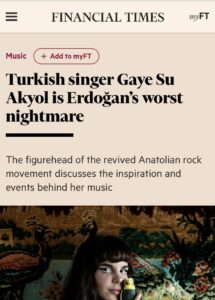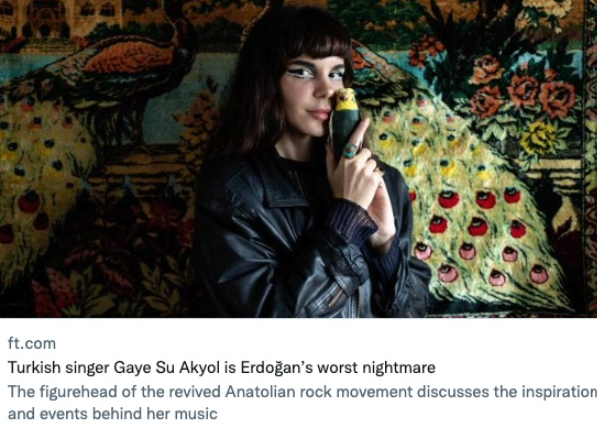The UK-based Financial Times has changed the headline of an article on Gaye Su Akyol, a dissident Turkish rock star who is considered an important figure for the LGBTQI+ community, after social media users said describing her as the “worst nightmare” of Turkish President Recep Tayyip Erdoğan was an exaggerated statement, local media reported on Wednesday.
The initial headline of the article, which was written by Nick Hasted based on an interview with Akyol on the occasion of her new album, Anadolu Ejderi (Anatolian Dragon), and published on the website of the newspaper on Wednesday, was “Turkish singer Gaye Su Akyol is Erdoğan’s worst nightmare.”

The headline was later changed to “Turkish singer Gaye Su Akyol — hope and freedom” following reactions on Twitter.
Hasted said when he last saw Akyol in İstanbul in 2019, she resembled President Erdoğan’s worst nightmare since she was “singing to a fervent crowd in her native, bohemian quarter of Kadıköy” wearing “a batwinged silver cape and matching bustier, with her midriff bare and boots thigh-high.”
“She was a deliberately inspirational, sci-fi vision of sexually liberated, female Turkish rock’n’roll rebellion,” Hasted said.
He also quoted the singer as saying that she was “a protector of human rights, woman rights, queer rights, [and] LBGTI rights” and that was enough reason for the Justice and Development Party (AKP) government to hate her. “But I don’t care about their dark ideas,” she said.
After the article was published, many Twitter users said the description of the singer as “Erdoğan’s worst nightmare” was an exaggerated statement and a failed attempt at PR.
Journalist Selim Sazak said in a tweet that although he loved Akyol’s music and her choice not to avoid adopting a political identity, he was almost sure that Erdoğan didn’t know anything about her or her art, let alone seeing her in his nightmares.
Gaye Su Akyol'u severim. Müziği hoş. Siyasi bir kimlik benimsemesi, bundan kaçınmaması da iyi. Fakat neredeyse eminim ki Tayyip Erdoğan Gaye Su Akyol'u kabuslarında görmek şöyle dursun ne yüzünü bilir, ne müziğini tanır. Herhangi bir günde adının aklından geçtiğini dahi sanmam. https://t.co/KMPe0tHg7Z
— Selim Sazak (@scsazak) November 30, 2022
“GSA’s new album is fantastic. At no fault of hers, the writer of this Financial Times piece (a guy named Nick Hasted who previously wrote books on Jack White and Eminem, with no knowledge of Turkey) opted for a sensationalist, irresponsible, and frankly kind of orientalist take,” Kenan Behzat Sharpe, an İstanbul-based journalist and academic, also tweeted.
GSA’s new album is fantastic. At no fault of hers, the writer of this Financial Times piece (a guy named Nick Hasted who previously wrote books on Jack White and Eminem, with no knowledge of Turkey) opted for a sensationalist, irresponsible, and frankly kind of orientalist take. https://t.co/C8GDUNZd0x pic.twitter.com/ytvJe8Kerj
— Kenan Behzat Sharpe (@kenan_sharpe) November 30, 2022
A Twitter user pointed out the irony in the article that the Turkish president’s worst nightmare was Akyol and not the musicians in Turkey who died on hunger strikes, were imprisoned or had to flee the country because of their political or religious ideology or ethnic roots.
Açlık grevinde ölen, rejimin zindanlarında ve sürgünde bedel ödeyen müzisyenler değil de Gaye Su Akyol Erdoğan’ın en büyük kabusu öyle mi? https://t.co/mgcbMAKpoA
— serkan kabak #RantYolunaHayır (@serkankabakk) November 30, 2022
Dissidents frequently accuse President Erdoğan and his ruling AKP of interfering with people’s lifestyles and trying to force their Islamic values on the nation.
